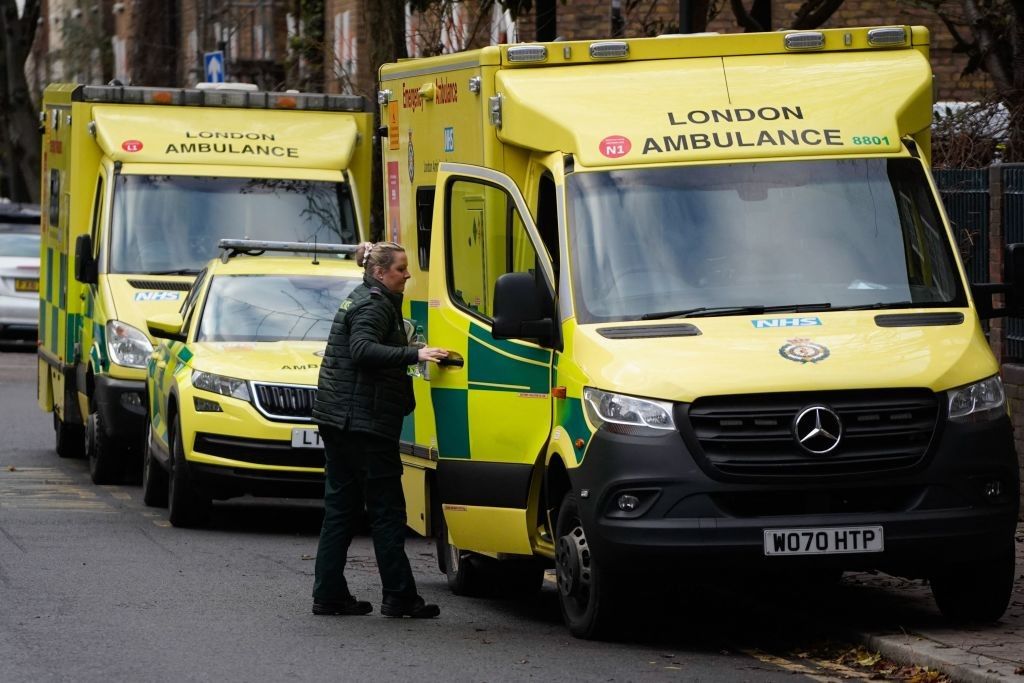- Saturday, July 27, 2024
Employees across the UK economy are demanding salary rises in the face of decades-high inflation — currently running at nearly 11 percent — which is spurring the worst cost-of-living crisis in a generation.

By: easterneye.biz Staff
Britain’s health minister Steve Barclay on Wednesday said people should use their common sense as the healthcare system will be under pressure as ambulance workers strike on Wednesday.
“I think just use their common sense the system will be under very significant pressure,” he told BBC News.
“I think people can see that in terms of the fact that the trade unions are not covering all of the urgent calls which themselves, category three, can become very serious.”
UK ambulance workers went on strike Wednesday, widening a dispute with the government over its refusal to increase pay above inflation after recent walkouts by nurses.
A series of stoppages are causing misery in Britain in the run-up to Christmas, with railway workers and passport control officers also threatening to ruin festive holiday getaways as the government refuses to cede on pay demands.
On Wednesday, ambulance staff at the state-run National Health Service (NHS), including paramedics and call handlers, walked out, prompting warnings from healthcare leaders about straining a health system already in crisis.
Thousands of members of the Royal College of Nursing (RCN) in England, Wales and Northern Ireland took to picket lines on Tuesday, just five days after their first strike in its 106-year history.
‘Immense pressure’
Employees across the UK economy are demanding salary rises in the face of decades-high inflation — currently running at nearly 11 percent — which is spurring the worst cost-of-living crisis in a generation.
“We want the government to actually wake up and realise that this situation is serious.”
Matthew Taylor, chief executive of the NHS Confederation, urged the public not to panic during strikes on Wednesday.
“It’s important to say that if you have a life-threatening emergency, you must call 999 and the trade unions have made absolutely clear they’ll respond to those,” he said.
Adrian Boyle, president of the Royal College of Emergency Medicine, however, said the emergency system had been under “immense pressure” for the last three years.
He called the last year “the worst we’ve ever seen it” when it came to delays in getting patients into the hospital from ambulances due to a lack of beds.
He said accident and emergency departments were expecting people to make their own way to the hospital — even those with life-threatening conditions.
‘Cold shoulder’
“We’re expecting people with strokes and heart attacks to turn up at the front door. Now, because of the delays, this has already been happening quite a lot anyway,” he told Times Radio.
But the government insists it must stick to more modest increases for public sector workers recommended by independent pay review bodies.
“The best way to help them and help everyone else in the country is for us to get a grip and reduce inflation as quickly as possible,” Prime Minister Rishi Sunak has said.
The RCN has criticised the government’s stance and accused Health Secretary Steve Barclay of adopting a “macho” negotiating style during recent brief meetings.
It has warned that nurses would take wider industrial action next month if the government “keeps giving our nursing staff the cold shoulder”.
Ministers have drafted in 750 military personnel to drive ambulances and perform logistics roles to mitigate the impact of Wednesday’s ambulance strike.
Despite the government’s insistence that it will not negotiate, polls indicate most people support nurses, and to a lesser extent other workers walking out.
YouGov polling published Tuesday showed two-thirds of Britons support striking nurses, with 63 percent support for ambulance staff.
Mrunal Thakur on Dhamaka, experience of working with Kartik Aaryan,…
Nushrratt Bharuccha on Chhorii, pressure of comparison with Lapachhapi, upcoming…
Abhimanyu Dassani on Meenakshi Sundareshwar, how his mom Bhagyashree reacted…